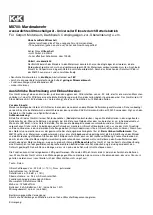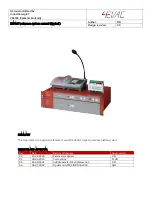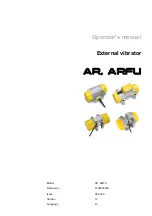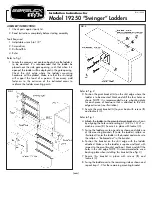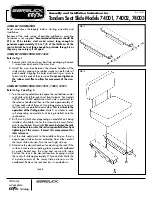
13
1.6 INTERMEDIATE RAIL (FA 20 702 01)
only KS8000
/ (FA 20 702 00)
only KS9000
The intermediate rail is an aluminium rail on which the slide travels smoothly, with no resistance. The intermediate and extremity rails (top and bottom)
are connected to each other with splice bars (FA 20 704 00).
Standard length: 3 m
Weight: 4 kg
Material: Aluminium
Installation:
•
See SPLICE BAR § 1.7
1.7 JUNCTION(FA 20 704 00)
for KS8000
et
for KS9000
The junction connects the different sections of rail in the KS8000 and KS9000 systems.
Weight: 1.16 kg
Material: 316 stainless steel
Tools needed: 13 mm spanner wrench
Installation:
•
Place the rails end-to-end, slide the splice bar (FA 20 704 00) over the junction of the two rails so that it is centred between the rails. This will
ensure that the two rails are perfectly aligned.
•
Place a junction on each side of the aluminium rail, lining up the holes in the splice bar with those in the intermediate rails. Affix the two plates
with the four sets of fasteners (Fig. 6).
•
Make sure that the gap between the two rails is no more than 1.5 mm.
1.8 ALUMINIUM TOP RAIL EXTENSION (FA 20 701 00)
for KS8000
and
for KS9000
The systems are equipped with a top rail extension which curves at the top of the ladder and the work platform. This allows the operator to stay
connected to the slide all the way to the top of the ladder, and then detach once he or she is safely on the work platform.
The top end also has a spring-loaded retractable termination (A).
Length: 1.50 m
Weight: 2.90 kg
Material: Aluminium.
Installation :
•
Affix the upper extension to an intermediate rail (FA 20 702 01 for KS8000; FA 20 702 00 for KS9000) with a junction, as described in paragraph
1.7 (See Fig. 7).
•
The bottom edge of the upper rail must be affixed 30 cm below the work platform where the user detaches.
•
A mounting bracket must be installed on this upper rail. It must be screwed in approximately 19 cm below the work platform where the user
detaches.
•
RECOMMENDATIONS: The intermediate rail below the upper rail must be cut to the correct length so that the upper rail is positioned as
described above. Holes must also be made to accommodate junctions, being careful to ensure that there is a maximum space of 1.5 mm
between the two rails.
=>VARIATION :
A bottom end rail can be installed on the top part (depending on your receiving structure). In this case, the non-inverting system will be
positioned on the right side of the rail and will aim to block the trolley at the upper end of the top rail. In order to be able to remove the trolley from the
rail, take care to disassemble the non-inverting system (L clamp) and to reassemble it on the other side of the rail (it will thus be positioned to the left of
the rail when facing the rail in the direction it is used). The procedure is identical when using the curved rail in the upper part.
1 : Éclisse (X2)
2 : Boulon (x4)
3 : Contre écrou (x4)
4 : Rondelle frein (x8
Fig. 6
Fig. 7
GB
A



































